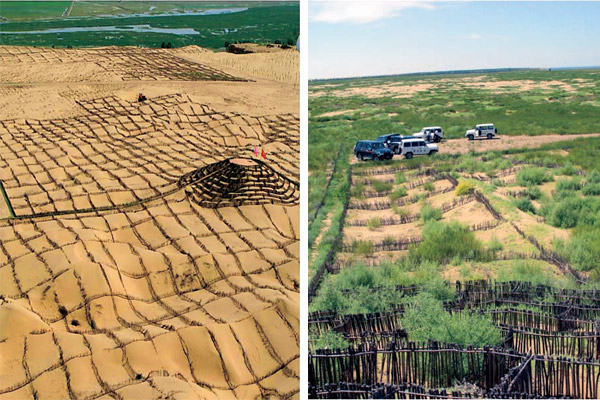Water project brings riches to desert area

This composite photo shows Kubuqi Desert in the past and the present, spanning 20 years. [Photo provided to chinadaily.com.cn]
Inner Mongolia villager makes himself a millionaire by raising cows and crabs.
The harsh natural condition of his hometown in a barren desert forced poverty-stricken Naranmandakh to emigrate in 2007.About 10 years later, the 51-year old man of Mongolian descent decided to come back, still poor. Since then, however, he has become a millionaire.
Naranmandakh's success may leave many people astonished, but they might be even more astounded to see the change that has occurred to his hometown in the Kubuqi Desert in the Inner Mongolia autonomous region.
People in the area no longer suffer from severe water shortages. Instead, they have even developed an industry that depends heavily on aquatic farming.
For decades, Naranmandakh's family made a living from cow and goat herding. The increasingly scarce water resources near his village of Bayanundur, however, made it hard for him to continue his business.
"I raised 200 goats before I moved away," he recalled.
"As the ecological condition deteriorated, however, some natural wetlands we heavily depended on to get water for the animals shrank. It was increasingly difficult for us to get drinking water."
Naranmandakh, along with 18 other families, moved away to an area closer to the Yellow River with the help of the local government in 2007.
Though the village was suffering from a water shortage, about 31 billion cubic meters of water flow along a river across Hanggin Banner, where the village is located.
Due to the frequent ice jams that block the water flow during winter, however, people near the river in the banner often endured floods, said Liu Haiquan, head of the banner's water resources bureau.
But this is where the local government turned hazards into advantages that have made Naranmandakh a millionaire.
While greatly reducing the risk of ice jams, "the project has promoted the restoration of the local ecological system and brought marked benefits to people living nearby," Liu said, citing Naranmandakh as an example.



 Print
Print Mail
Mail





